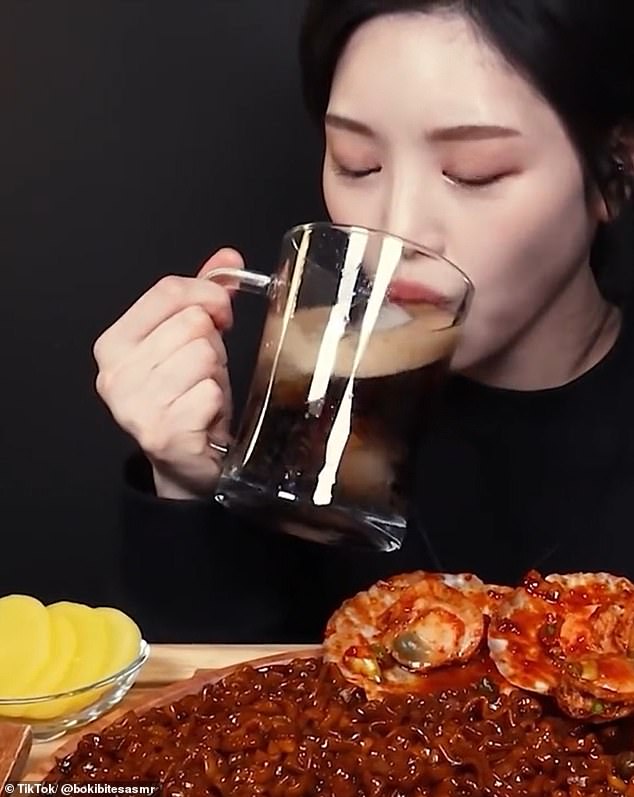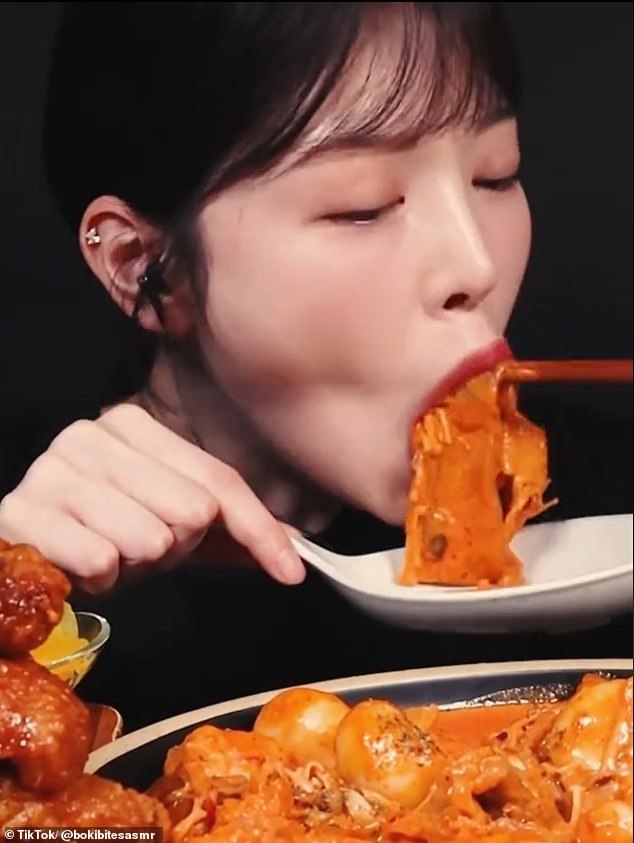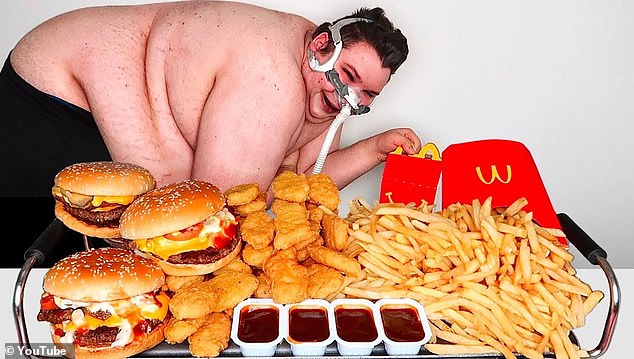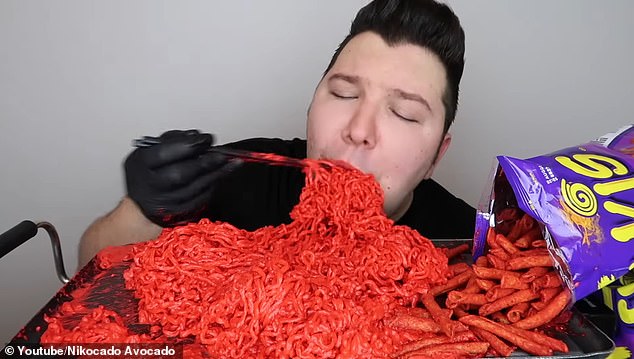How a new breed of influencers is making fortunes by eating massive amounts of food in front of a live online audience – with deadly consequences
Boki, a young Korean YouTuber, serves a huge bowl of noodles with fried eggs and an assortment of dumplings and kimchi (fermented vegetables).
It is a feast that is enough for a small family, but the meal is not meant to be shared.
In a video posted to her outrageous ‘Eat With Boki’ channel, the svelte young woman pours herself a giant glass of Coke, takes a big gulp — and then starts scooping up noodles with her chopsticks and stuffing them into her mouth. All of them.
For ten minutes, Boki wolfs down one bite after another, slurping noisily, but somehow barely managing to fade her red lip gloss.
Only when the plate is empty does she look into the camera and say to her ten million subscribers: ‘I ate it all! I ate well. Bye.’
Welcome to the world of ‘mukbang’, a global culinary phenomenon that has millions of loyal viewers, especially women, hooked.
Boki, a young Korean YouTuber, indulges in a massive amount of food, also known as a mukbang challenge in front of a live audience
Mukbang is a combination of the Korean words for “eating” (meokneun) and “broadcasting” (bangsong). The series sees the stars devouring huge amounts of food in front of the camera, then posting clips for their followers.
And they do it because it’s lucrative, with thousands of ‘mukbangers’ on YouTube and TikTok now competing to outdo their rivals and rake in advertising revenue. Some are said to be millionaires.
But there is a dark side to this obsession. Last month, Chinese mukbanger Pan Xiaoting died after gorging himself on 22 pounds (10 kg) of food. The morbidly obese 24-year-old died of a suspected stomach ‘rupture’.
Xiaoting collapsed live on camera during a ten-hour binge on chocolate cake, chicken nuggets and seafood.
China had already banned such videos, but even the authoritarian Communist Party could not stop Xiaoting and others from “livestreaming” meals (instead of posting clips afterward).
But mukbang is a public health threat beyond China and Asia, spreading to the US and even the UK, with several countries cracking down on the phenomenon.
Dr Andrew Harris, a psychology lecturer at the University of Nottingham, warned: ‘Mukbang videos revolve around consumption and excess, potentially reinforcing a cycle of overeating or unhealthy relationships with food.’

Boki slurps down a large pint of coke as she dishes up another large plate of food for her followers

For ten minutes Boki shovels mouthful after mouthful, slurping noisily but somehow barely smudging her red lip gloss

Chinese mukbanger Pan Xiaoting (pictured eating a Burger King) has died in a shocking manner while gorging himself on 10 kilos of food, live on camera

Pan Xiaoting (pictured eating fast food) died after a ten-hour binge of chocolate cake, chicken nuggets and seafood in front of a live online audience
The trend first emerged in South Korea, where communal dining is culturally important. With an increase in the number of young Koreans living alone – partly due to Covid and declining marriage and birth rates – there was a demand for ‘virtual’ table companions.
In addition, more than a quarter of South Koreans in their 20s have temporary jobs, and making mukbang videos has become a way to earn extra money.
That was the case for Jeongae Kim, who worked two jobs to support her mother.
Attracting viewers isn’t just about how you eat, it’s also about what you eat. Jeongae’s 2.9 million subscribers love watching her feast on seafood or spicy food, she claims.
Before she became famous on YouTube, she lived in a small apartment and recorded videos at 3am to make sure there was no background noise. Thanks to mukbang, she now lives in a spacious apartment.
So how much do these professional eaters earn? YouTubers with over a million subscribers can potentially earn around £62,000 a year, while top creators – those with over ten million subscribers – can earn up to £310,000 a month. It’s no wonder that demand for mukbang has grown outside of Asia too.
Trisha Paytas is a Los Angeles-based YouTuber who films herself eating everything from scrambled eggs to buckets of fried chicken for her five million subscribers. “I did a Pizza Hut version where I eat five different pizzas,” Paytas told ABC News. “And I think that made about $50,000.”
While she may be raking in the big bucks, she’s had to pay a price. The mother of two has struggled with depression and an eating disorder, which has escalated to over 15 kt. Online trolling has only exacerbated her insecurities.
“Everyone’s favorite comments are ‘Miss Piggy,’ ‘You’re obese,’ and ‘Keep putting food in your mouth,'” she said. “As those kept growing, so did my weight.”

Nikocado Avocado, or Nicholas Perry in real life, was previously vegan when he lived in Colombia with his husband Orlin.

But the 32-year-old has amassed a net worth of £3million by stuffing himself in front of the camera and millions of people (pictured on a scooter with his hands full of Takis)

After eating 10,000 calories a day (pictured eating noodles and takis), Perry suffers from obesity and respiratory problems
Her struggle with her size prompted her to have liposuction in 2017, but the pounds piled back on – not least because eating is essentially her job.
Then there’s 32-year-old Nikocado Avocado, or Nicholas Perry in real life, who has a net worth of around £3million. The American now consumes more than 10,000 calories in one sitting, live on camera, almost every month.
Perry went from 11.5 st in 2016 to about 25 st. He suffers from obesity and respiratory problems and is often shown in his videos wearing a mask for his sleep apnea.
Fans reportedly warned Pan Xiaoting about the damage she was doing to her body, but as her popularity grew, her portions became larger.
Which brings us to another element of mukbang’s appeal – people get to ‘eat’ vicariously. They indulge in the pleasure of others eating without the negative consequences – not least of which is weight gain.
Researchers who monitored the brain activity of mukbang viewers found that the nucleus accumbens – the subcortical brain structure best known for its role in pleasure and addiction – responded more strongly to others’ consumption of high-calorie foods.
It’s not uncommon to see comments under online mukbang videos like, “Is anyone else watching this so they don’t eat?”
Lydie, a video blogger who became Britain’s first mukbanger in 2016, believes her YouTube channel can help people with eating disorders.
More than 100,000 people watched the 25-year-old translator from Yorkshire as she devoured McDonald’s burgers, fries and chicken nuggets. ‘I know I won’t feel like eating when I watch mukbang,’ she told an interviewer.
But health officials around the world are now warning that the growing interest in mukbang poses a real danger to influencers.

Trisha Paytas (pictured in a video) is another prolific American mukbanger and confessed that she earned about $50,000 by eating five pizzas in a mukbang

Although the mother of two children is raking in a tidy sum of money, she is in turmoil after previously admitting that she suffers from an eating disorder

Her struggle with her size led her to undergo liposuction in 2017
In 2018, when adult obesity was approaching 40 percent, the South Korean government launched an anti-obesity plan, saying “harm was caused by media that encourage gluttony, such as mukbang,” and that there was insufficient oversight of such online content.
Meanwhile, China announced stricter policies and closed 13,000 mukbang accounts in 2020. At that time, there were about 395,000 videos that had been viewed nearly 30 million times.
Last month, it was reported that the Philippine government was considering banning the content after its creator, Dongz Apatan, suffered a fatal stroke after gorging on fried chicken.
But in a world increasingly virtually connected but disconnected from reality, the demand for mukbang videos – and the wealth they can generate for their creators – is unlikely to diminish anytime soon.
